Cornea Surgery Dallas
“Your work has made an immeasurable difference in my life.”
— Rami Q., Cornea Transplant Patient, 5-star review
Full range of transplants and minimally invasive procedures
National leaders in corneal transplants, crosslinking & advanced solutions
- Named among Newsweek’s “Best Ophthalmologists in the U.S.”
- Recognized by D Magazine & Texas Monthly for excellence in care
We Offer a Non-Surgical Solution With Intacs Corneal Implants
/
For patients who don't want to undergo a corneal transplant and have mild to moderate keratoconus, Intacs® corneal implants may be an option.
Trust Our Dallas Specialists With Your Eyesight Request a Consultation
With us, your care is handled by a collaborative team of board-certified surgeons, many of whom teach, publish, and speak nationally on the future of corneal care. Our specialists have helped shape FDA trials, refine laser surgery techniques, and introduce minimally invasive options that are now used across the country.
We’re honored to be recognized not just for our expertise, but for how we treat people. Newsweek, D Magazine, and Texas Monthly have all named us leaders in vision care. Call us or send us a message to get started on your journey to better sight at our ophthalmology offices in Dallas, Fort Worth, and Plano.

A Gift of Independence We Improved Rami's Life With Surgery
"I wanted to take a moment to express my sincerest gratitude for the life-changing cornea transplant surgery you performed. Thanks to your exceptional skill, dedication, and compassionate care, my vision has improved significantly, and I am filled with hope for the future.
Your expertise was not just medical—it was a gift of light and independence…The way you blend professionalism with genuine kindness is rare and deeply appreciated.
Your work has made an immeasurable difference in my life. I will always remember your contribution with immense respect and gratitude."
— Rami Q., 5-star review
How Can Cornea Surgery Help You?
Reduced Discomfort
Scarred, injured, or infected corneal tissue can be very painful. Corneal surgery can alleviate your symptoms by restoring or replacing any damaged areas.
Restored Appearance
Some conditions which affect the cornea, such as pterygium, are noticeable. Surgery can improve the look of your eye in these cases.
Versatile Treatment
Our doctors offer corneal surgeries to treat various disorders, including keratoconus, thinning corneas, ulcers, and more.
Clearer Eyesight
Corneal transplants and other surgeries can help patients clear their blurred vision and reduce reliance on glasses and contact lenses.
Cornea Surgery Is Commonly Performed
Cornea transplants, known as keratoplasty, are the most commonly performed and the most successful allogenic transplant (meaning they use stem cells from donor tissue) worldwide. Patients find comfort in the frequency of cornea procedures, our corneal specialists' detailed approach, and the safe, proven reputation corneal transplants and other surgeries have in restoring corneal tissue.

Although the idea of corneal surgery can be daunting, know that these procedures have been widely and safely performed for many decades. Thanks to advancements in technology and training, the treatments also have high success rates, and our team of fellowship-trained corneal specialists has helped many patients overcome corneal issues with satisfactory results.
Other Cornea Surgeries We Perform
Pterygium Removal
Excess tissue that grows out of the cornea is called "pterygium." Pterygium growths are typically caused by long-term exposure to UV light and chronic dryness or irritation, which is why it's commonly referred to as "surfer's eye." Pterygium growth can cause discomfort and affect vision if left untreated. During the pterygium procedure, your doctor will make an incision, remove the excess tissue, and may use a graft to cover the area.
Photorefractive Keratectomy
Photorefractive keratectomy (PRK) is a type of corneal surgery that uses an excimer laser to reshape the corneal tissue. It corrects refractive errors like astigmatism, which can reduce the need for glasses or contact lenses. The procedure alters the cornea's curvature by flattening or steepening the eye's surface, similar to LASIK, improving how light enters the eye and focuses on the retina.
Cornea Crosslinking
Corneal crosslinking is a procedure that treats keratoconus, a condition where the cornea becomes weak and progressively more cone-shaped, often causing astigmatism. Corneal collagen crosslinking for keratoconus doesn't remove any corneal tissue, unlike the procedures mentioned above. The goal is to prevent further progression of keratoconus by adding structural connections, known as "crosslinks," to stabilize the cornea and improve the patient's vision.
Surgical Results That Stand the Test of Time
“I had corneal transplant surgery with Dr McCall over 16 years ago and every opthamologist or optometrist I have seen since my surgery universally tells me “wow.. what an amazing job your surgeon did on your transplant.” If you need a transplant, Dr McCall should be your first choice . I am living proof that he does amazing work.”
— Gideon D., 5-star review








